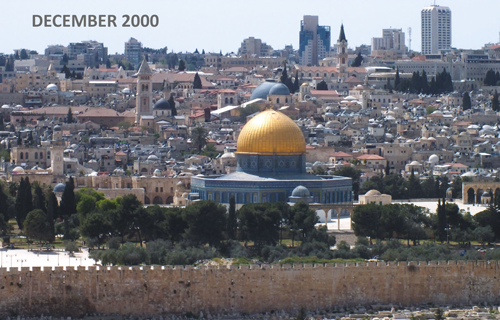THE ROVING DIPLOMAT
TRIBUTE series
PEACE BLOWS HOT AND COLD
Tension builds in the Middle East and tempers cool on the Korean Peninsula
The international scene is witnessing a paradoxical juxtaposition of the dawn of peace in one region and gathering of war clouds in another. The regions under consideration are the Middle East and East Asia where significant but contrasting developments are taking place.
In the Middle East, the struggling peace process, which has survived several vicissitudes, appears to be on the brink of a breakdown with the failure of the latest round of talks between the Prime Minister of Israel Ehud Barak and Chairman of the Palestine Liberation Organization (PLO) Yasser Arafat.
Barak informed his cabinet of the failure of this round of talks and announced that he was taking time out of peace talks with the Palestinians to reassess the situation. This decision is apparently his reaction to the recent Arab Summit in Cairo where there was forthright condemnation of Israel and its policies.
He condemned the language of threats used during the summit as the reason for his suspension of negotiations. Arafat reacted angrily and retorted that Barak could do as he wished, affirming a determination to pursue his objective of the declaration of a State of Palestine with Jerusalem as its capital.
The two day summit in Cairo, which was attended by 22 states as members of the Arab League, was a reaction to the outbreak of violence between Israel and Palestine. This particular incident resulted in the deaths of about 130 Palestinians. The summit described Israel as ‘barbaric’ and called for a war crimes tribunal to investigate its actions.
In the final resolution of the summit, a number of demands were made from the UN. Among them was that the UN Security Council should accept responsibility for protecting Palestine from Israeli occupation with a view to establishing an international force.
The demands also stated that the United Nations should be responsible for Palestinian territories and its people. In addition, it said that the Security Council should establish a war crimes tribunal to try Israeli war criminals and an international commission of enquiry to investigate the causes of violence.
However, the summit stopped short of a boycott of Israel or severing of ties though Tunisia took this step unilaterally.
Meanwhile, both Hamas and Islamic Jihad have described Middle East peacekeeping as a sellout of the Palestinian cause.
Opinions differ as to the impact of the Cairo Summit but the suspension of peace talks and Arafat’s position haven’t changed. One view is that it in fact enhanced his position in the Arab world and should enable him to declare a State of Palestine soon.
On the other hand, the suspension of negotiations could result in increased violence with the risk of an all-out war. For Barak, the options are equally limited and uncertain; and the obvious path he has chosen is to team up with his Likud rival Ariel Sharon.
However, the terms for such an alliance could be fatal for Barak because they amount to renouncing the proposals tabled at July’s Camp David talks, which included the handover of 90 percent of the West Bank to the Palestinians and some areas east of Jerusalem too. Nevertheless, Israel refused to compromise on the sovereignty of Jerusalem, which was demanded by the Palestinians.
Support from the Likud Party is essential for Barak to ensure the fate of his own government, which faces a vote of no confidence in parliament. The future of the peace process and peace in the region would depend on whether or not the two parties can form an acceptable partnership.
Another approach is to control the escalation of violence since Palestinian youth are taking up arms and Israeli forces are in an equally vengeful mood. It is the inability to control this violence on both sides that’s responsible for the present crisis.
Meanwhile, the prospects for lasting peace seem to be improving in East Asia. The 2000 inter-Korean summit took place in Pyongyang in June between South Korean President Kim Dae-jung and Chairman of the Democratic People’s Republic of Korea Kim Jong-il. This was the first time North and South Korea have met at the negotiation table since the Korean War.
The North-South Joint Declaration – which was the outcome of the summit – was adopted by the heads of the two nations following several rounds of diplomatic meetings between Pyongyang and Seoul. A significant result of these talks was the reunification of numerous Korean families who had been separated for nearly 50 years as a result of the Korean War.
BY The late Deshamanya Dr. Vernon L. B. Mendis




